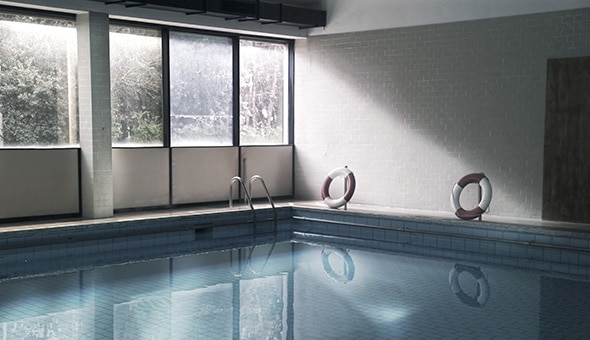In a recently released Canadian study, it was found that workers who spent more than 500 hours a year or 10 hours a week working in an indoor pool are two to six times more likely to have coughs, asthma, and throat and eye irritation. The study conducted on close to 900 lifeguards found that symptoms lessened while they were not at work which would suggest that the indoor pool environment may be prompting the symptoms.
Published by the International Journal of Environmental Health Research, the study clearly shows the fact that indoor swimming pool environments may have damaging affects on the respiratory system due to the time spent in this environment.
Of the 870 surveyed, 601 were working as lifeguards at the time of the survey with ages ranging to 18 to 64 years. The average age for current lifeguards was 22, and former lifeguards 29 with three quarters of those surveyed being 29. Using an online questionnaire, the lifeguard’s exposure to indoor swimming pool environments was assessed and symptoms such as cough, sputum, shortness of breath, wheezing, lung congestion, sneezing, throat or eye irritation, hoarseness, stuffy nose and ear pain. Lifeguards were also asked if they have been diagnosed with asthma or used asthma medications.
A huge 78% of lifeguards reported having at least one of the respiratory symptoms in the previous year and 23% reported to have been diagnosed with asthma. Spending more than 10 hours a week at an indoor pool made lifeguards two and a half times more likely to have a cough or sore throat compared to those spending less than an hour a week. This extended exposure also meant that eye irritation was over four times more likely to occur. Those diagnosed with asthma exposed to more than 500 hours a year were 6 times more likely to have an asthma attack than those with little to no exposure to an indoor pool environment.
Most swimming pools are disinfected with chlorine-based disinfectants, because of that the reaction between the chlorine and organic matter such as skin cells, cosmetics, sunscreen and sweat in water creates many contaminants called disinfection-by-products (DBP). These contaminants are what gives the indoor pools their characteristic chlorine smell.
These contaminants paired with a high humidity in the indoor pools creates a damaging environment to the health of those who spend large amounts of time in the indoor pools. When the contaminants mix with a high chemical concentration they are trapped within the confines of an indoor room.
A dehumidifier is a vital part of an indoor pool to ensure that all users stay healthy and comfortable. Dehumidifiers are designed to remove excess humidity from your indoor pool air and deliver ventilation to control pollutants caused from normal pool activity.
EvoHeat has produced a range of domestic and commercial dehumidification units to tackle this very common problem seen in many indoor swimming pools. The EvoHeat dehumidifiers are specifically designed to remove moisture from the air within a room without losing any warm air that is contained within.
For more information on our EvoHeat dehumidification units click here or contact one of our EvoHeat specialists on 1300 859 933.






